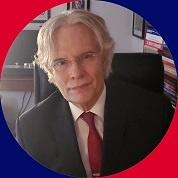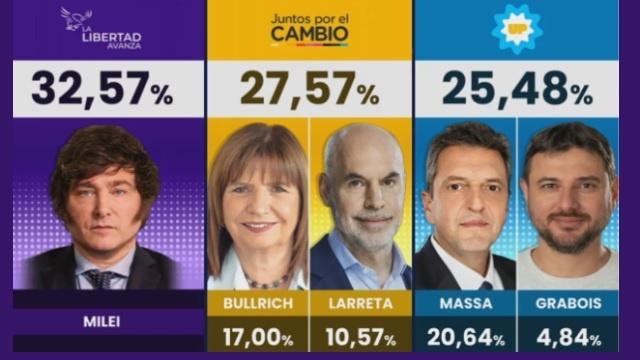The upcoming election in Argentina offers the South American giant a golden opportunity to change course and depart from the control of Peronist hegemony. With the third-largest economy in Latin America (after Brazil and México), a highly educated and capable workforce, and an abundance of natural resources, Argentina has been held captive for many years by toxic left-wing dogma that has decimated living standards for Argentinians. Two of the three front-runners in the October 22 election promise to chart a different course. Javier Milei, the leading candidate, appears firmer in potentially completing the task since his commitment to dismantle statism is ideologically deep-rooted.
Argentina entered the 20th century as a prosperous country. In 1913, it was wealthier than Germany, France, Spain, and a host of other first-world nations. Before the 1930s, it fluctuated in standing among the top ten global economies. The available 2023 data places Argentina, as measured by GDP, in the 23rd spot in the world. This is over 100% less than where it stood at the beginning of the last century. Why the shrinkage?
It is not just a matter of sluggish economic growth. Inflation, a proven menace that impoverishes living standards and siphons wealth as a hidden tax, has vexed Argentinians for generations. We are talking about double-digit inflation. Additionally, this combined malaise of sedated growth and high inflation has caused its currency to plummet. The basket case of prosperity that Argentina once was has been relegated to the history books. When did this downward spiral begin?
While there is never simply one single causal agent, a specific variable can be noted to have begun this detrimental shift. That factor has been Juan Domingo Perón, his policies, the large following that the movement he spearheaded received, and the dominance that Peronism has had over Argentinian life. Pursuing an agenda that aimed to court the working class, statism was instituted in comprehensive terms in Argentina. This has had an enormous socioeconomic impact on Argentinian society that persists today. Clientelism blossomed, capital departed, and a country once noted as a magnet for immigration has become a net exporter of human capital by way of emigration to Europe, the U.S., and other Latin American nations.
Javier Milei is an economist, a self-described Libertarian/Classical Liberal, and an elected member of Argentina’s Chamber of Deputies (Congress). As the prime candidate in the 2023 presidential race, he promises to revert the lackluster socioeconomic model that has pillaged wealth and living standards for generations to the paradigm that Argentina employed in its glory days. While critics question his ability to overhaul the existing entrenched system, Milei is sure this is achievable. Empirical evidence of what works and what does not, from an economic standpoint, and his dogmatic insistence on applying the necessary prescriptions is reassuring, considering that others before him pledged the same thing.
Notable politicians such as Carlos Saúl Menem (1989–1999), Fernando De La Rúa (1999–2001), and Mauricio Macri (2015–2019), considered pro-market and antisocialist by Argentinian standards, sought to dismantle Perón’s maligned, but long-standing, multiparty prototype. While each did relatively well, within varying degrees, in challenging and supporting a framework for a departure from the established statist hold (which includes the cultural sphere), the result was never sufficient to expunge the ill past and generate a national renewal. The lines structured by the nation’s founding fathers, which laid the groundwork for Argentinian exceptionalism, that distinctive element that underscored Argentina’s mid-19th and early 20th century success story, were never reached.
The consecutive presidencies of Néstor Kirchner and Cristina Fernández de Kirchner (2003–2015) forged the most far-left governments in Argentinian history. Stemming from the Peronist Youth, the university arm of the Marxist Montoneros terrorist group, the Kirchners radically sought to align Argentina along the continental socialist mold as outlined by the Cuban regime with the Sao Paulo Forum model. Together, they dissembled Argentina’s reconciliation laws passed by Menem to avert division stemming from the country’s civil war (1955–1979, 1989)[1] between communist guerrillas (rural and urban) and democratic, as well as military/civil non-democratic regimes, and began a one-sided application of the law, prosecuting only those on one band of the conflict.
Kirchnerism unpegged Argentina’s peso from the dollar. The point of this policy, established by Menem and continued by De La Rúa was to avoid the chronic appearance of inflation and hyperinflation. However, the downside was the higher cost of Argentinian exports. Néstor Kirchner immediately ended this policy, which, on a short-term basis, made Argentinian products more attractive to foreign markets. Together with an expansive and costly social spending scheme, the result has been a burgeoning underclass dependent on the state, a hostile business climate, rampant crime, social insecurity, drug trafficking, gross corruption, and impunity for left-wing groups that operate marginally. Kirchnerism also severed the basic principles of the rule of law. The government of Alberto Fernández (2019–present) is considered a de facto continuation of the Kirchner dynastic reign, since Cristina Fernández de Kirchner is the vice president and carried Leftism into the administration.
Addressing the cultural war that Marxist-based theories have ladened Argentina with has also been Milei’s focus. By insisting he will reverse the privileges and special class status that previous governments granted (including Macri’s) to identity politics projects such as Gender Ideology, Critical Queer Theory, Radical Feminism, and other woke cults, he has associated himself with conservative and Western civilizational values. While this is morally and philosophically consistent with a democratic ethos, Milei has been malignantly branded as “far-right” by left-wing outlets, media pundits, and even some atheistic libertarian circles. When Milei labeled Pope Francis a communist, he was not off-key, as a matter of fact. Jorge Mario Bergoglio has had deep-seated intellectual and emotional connections with Marxist-inspired liberation theology and far-left clerical themes since the 1970s. The question of whether Pope Francis is a theologically and morally qualified heir of St. Peter has been raised by many Catholics, not just Milei.
Sergio Massa, the current government’s Minister of the Economy, is a product of the Peronist tradition. The obvious ties he has with Kirchnerism, as a standing member of the Fernández cabinet, assure us that Massa will continue Argentina on a downward path. It is not simply a question of exaggerated redistributionism. It is the fundamental acceptance of outdated socialist policies and Marxist cultural adages that Massa’s party is committed to that confirms continuity along the same path, which is to say the worsening of the critical situation confronting Argentina.
Patricia Bullrich, currently polling in third place, was Macri’s Security Minister. Many see her candidacy as the offspring of her former boss’s government. Bullrich, a former Montonero communist member, broke with socialism a while back. However, the disappointment that Macri’s presidency turned out to be for many who expected an overhaul of the Peronist paradigm, his ambivalence on many key issues, and his reluctance to tackle structural problems plague Bullrich’s candidacy. In other words, many Argentinians see Bullrich as Macri II. They are probably right.
The “radicalness” of Milei, eccentric rock musician style aside, is his biggest asset. In assessing his country’s woes, he has been keen. A Milei presidency could extend the opportunity for institutional reforms. Freedom, in all spheres, is the focus of his candidacy. Natural rights, equality before the law, responsibility, and ordered liberty are the electoral themes proclaimed. Curtailing the embedded clientelism that the political caste has institutionally grounded appears to be a moral imperative. This is what is needed. Mere fiscal adjustments will not suffice. His enemies call him the “loco” (crazy one). Perhaps this type of “madness” is what Argentina requires.
[1] The first Marxist guerilla Peronist Resistance was commandeered by John William Cooke and launched the communist insurgency in September 1955. The Marxist war for political power was carried out by different movements. The main ones were the People’s Revolutionary Army (ERP) and the Montoneros, although there were at least fourteen socialist extremist splinter groups that participated at different intervals in the rural and urban insurgency. In 1986, the La Tablada military garrison was attacked by the communist group, All for the Fatherland Movement.
© The CubanAmerican Voice. All rights reserved.
 🖋️Author Julio M. Shiling
🖋️Author Julio M. Shiling
Julio M. Shiling is a political scientist, writer, columnist, lecturer, media commentator, and director of Patria de Martí and The CubanAmerican Voice. He holds a master’s degree in Political Science from Florida International University (FIU) in Miami, Florida. He is a member of The American Political Science Association, The PEN Club (Cuban Writers in Exile Chapter) and the Academy of Cuban History in Exile.
Follow Julio on:
📚Published books 📺In the media 👨🏫 Conferences and Symposiums 🎙️Podcast The Shiling Summary


